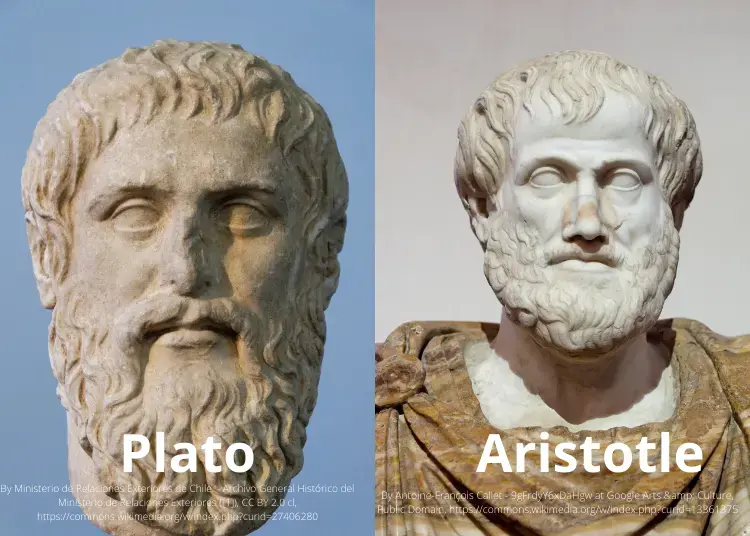Plato and Aristotle were two of the most influential philosophers of ancient Greece and their works continue to be studied and debated to this day. These two philosophers had a profound impact on the development of Western philosophy and their ideas and methods of inquiry still shape the way that we think about the world and our place within it.
Plato was born in Athens in 427 BC and was a student of Socrates. He was a prolific writer and his works, including the Republic, The Symposium, and The Timaeus, are considered some of the most important works of Western philosophy. Plato was interested in the nature of reality, the nature of knowledge, and the relationship between the two. He believed that knowledge was not something that could be acquired through experience, but was instead innate and that our senses were not capable of giving us true knowledge. He argued that there was a world of Forms or Ideas, which were perfect, unchanging, and beyond the world of appearances. He believed that the pursuit of wisdom and truth was essential for a good life, and that philosophy was the best way to achieve this.
Plato’s philosophy was heavily influenced by his mentor, Socrates, who believed that the key to wisdom was the ability to question and examine one’s own beliefs. Plato’s dialogues are often structured as debates between Socrates and other characters, and they serve as a record of Socrates’ method of questioning and inquiry. Through these dialogues, Plato explores the nature of justice, the ideal state, the nature of the soul, and many other important philosophical questions.
Plato’s dialogues are also famous for his theory of Forms, or Ideas. According to this theory, there exists a world of Forms or Ideas that is separate from the physical world we experience through our senses. The Forms are perfect and unchanging, and they serve as the objects of true knowledge. In contrast, the physical world is constantly changing and imperfect, and it is the source of opinions and beliefs rather than knowledge. For Plato, the goal of philosophy was to gain knowledge of the Forms, and he believed that the process of questioning and inquiry was the means by which this knowledge could be acquired.
Plato’s theory of Forms had a profound impact on the development of Western philosophy and it remains one of his most important contributions to the field. In particular, it influenced the development of metaphysics and epistemology, as well as the development of the idea of an ideal or perfect world. This idea was further developed by later philosophers, such as Plotinus and Neoplatonism, and it continues to be an important theme in Western philosophy to this day.
In addition to his philosophical contributions, Plato was also a prolific writer and his dialogues continue to be widely read and studied. Through his writing, he has had a lasting impact on Western culture and thought, and his ideas continue to influence contemporary debates and discussions in a range of fields, including politics, ethics, and epistemology.
Aristotle was born in 384 BC and was a student of Plato at the Academy in Athens. He was a prolific writer, and his works, including the Nicomachean Ethics, the Politics, and the Metaphysics, are considered some of the most important works of Western philosophy. Aristotle was interested in a wide range of topics, including ethics, politics, metaphysics, and biology, and his works reflect his belief in the importance of observation and empirical evidence. Unlike Plato, Aristotle believed that knowledge could be acquired through experience, and he was a pioneer in the study of biology, where he made important contributions to the classification and understanding of living things.
Aristotle’s philosophy was characterized by his belief in the importance of finding the mean or the middle ground between extremes. He believed that virtue was the key to a good life, and that the goal of ethics was to find the mean between excess and deficiency in the moral virtues. He argued that the virtues were habits that could be developed through repeated action, and that the goal of politics was to create the conditions that would allow individuals to develop and express their moral virtues.
Aristotle’s philosophy was also heavily influenced by his empirical and scientific approach to knowledge. He believed that knowledge was acquired through observation and experience, and he made significant contributions to the development of the scientific method by stressing the importance of careful observation and experimentation. Aristotle’s works cover a wide range of topics, including metaphysics, ethics, politics, biology, and more, and his ideas have had a profound impact on the development of Western philosophy and science.
In his ethical writings, Aristotle developed a theory of the moral virtues, which he saw as habits that could be developed through repeated action. He argued that the goal of ethics was to find the mean between excess and deficiency in the moral virtues, and that the mean could be determined by considering the right actions in a particular situation. For example, Aristotle argued that courage was the mean between the extremes of cowardice and recklessness, and that the right amount of courage in any situation was the amount that allowed one to act appropriately in the face of danger.
In his political writings, Aristotle argued that the goal of politics was to create the conditions that would allow individuals to develop and express their moral virtues. He believed that the ideal state was one in which individuals were able to live in accordance with their moral virtues, and he was a strong advocate for a balanced constitutional government that would allow for the expression of the moral virtues of its citizens. He also believed that education was essential for the development of the moral virtues, and that the state had a responsibility to provide its citizens with the education necessary to develop their moral virtues.
The works of Plato and Aristotle continue to be studied and debated to this day, and their ideas and methods of inquiry have had a profound impact on the development of Western philosophy. Both philosophers believed in the importance of reason and argument, and both were interested in exploring the nature of reality, the nature of knowledge, and the relationship between the two. While they had different views on some important philosophical questions, their works remain a testament to their contributions to the field of philosophy and their lasting impact on Western thought.

![]()
































GIPHY App Key not set. Please check settings